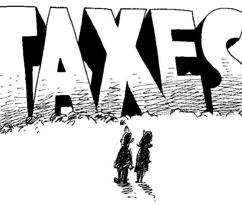Articles and News
TAXES IN 2013: BASICS YOU NEED TO KNOW | January 16, 2013 (0 comments)

Washington, DC—The 11th-hour negotiations to avoid the fiscal cliff gave some respite to businesses and markets, but many questions still remain.
Having some tax issues settled for good—or, at least without an expiration date—removes the uncertainty that’s tempered markets and held back many business owners from spending. But taxes are going up, even if not as much as originally feared.
Polls show that Americans as a whole favor raising taxes on the wealthy, but the definition of wealthy has been a sticking point because many of those tax returns actually represent small businesses filing as individuals. $250,000 per year—the income threshold originally proposed by President Obama—is affluent for a household income, but it’s pretty modest for a business income.
Why would a business owner want to file his business taxes as an individual and not as a business? To find out, The Centurion asked William McBride of The Tax Foundation, a nonpartisan tax research group.
“The biggest benefit to filing as a business [rather than an individual] is that you get to deduct your business expenses—and many businesses are unprofitable after deducting expenses.” It’s simple math—no profits equal no taxes owed on profits.
How much a business is taxed depends on how it’s been set up. A “C” corporation—which accounts for more than half of U.S. businesses—file under the C code and profits are taxed at an essentially flat rate of 35%. It’s not a 100% flat rate, says McBride, but it’s not a progressive rate like other forms of business are subject to.
Other business structures, such as sole proprietorships, LLC’s, partnerships, and “S” corporations are taxed at progressive rates ranging from 10% to 39.6% (essentially the same as individuals), which adds a lot of uncertainty, says McBride. Income is volatile, and there’s also some inherent unfairness: the top rate for these businesses now exceeds the C corporation rate, and the Tax Foundation maintains there’s no reason for taxing them at progressive rates.
Another benefit to filing as a business, rather than an individual, is that a business is considered a separate entity from the individual that owns it, and this legal separation can offer protection in the event of a lawsuit. A business owner who hasn’t separated his business as a legal entity may find his house and other personal assets tapped in the event of a suit.
So if a business can deduct its way out of paying taxes and can bear the brunt of a lawsuit without the owner’s private assets coming into play, why don’t all businesses simply file as a business and eliminate the debate on high income tax rates once and for all?
It’s complicated. The actual setting up of the business structure is fairly easy—fill out the appropriate papers and pay the fee—but like Facebook’s favorite phrase for defining relationships in flux, figuring out exactly what to file is the hard part. Should you be a partnership, an LLC, or an S-corporation? (A C-corporation is a public company with shareholders).
“We argue here that it shouldn’t be this complicated,” says McBride. “It’s very wasteful that businesses have to spend money to figure out what kind of form they should take, rather than spending the money on the business.”
Figures aren’t available for determining what% age of earners over $400,000 are business owners of a pass-through entity, vs. people who earn a high salary working for someone else. “We don’t know their motivation,” says McBride. But there are statistics on size: according to IRS data, millionaires (income of $1 million or more) account for 36% of all pass-through business income, while 30% of all pass through business income is in the $250,000 to $1 million range. (Pass-through business income “passes through” to the owner and is only taxed once as an individual, whereas C corporations are taxed on profits and shareholders are taxed on dividends, so while it’s one sum of money, it’s taxed on several different levels.)
Treasury department data pegs figures even higher—among businesses with at least one employee, millionaires account for 50% of the pass-through income, while 17% is in the hands of earners of $500,000 or more.
“It definitely skews to the high end,” says McBride.
Here are just a few of the key points of the tax laws passed two weeks ago, excerpted from the Tax Foundation website:
- Retains the 10%, 15%, 25%, and 28% income tax brackets from the Bush tax cuts permanently
- Retains the 33% and 35% income tax brackets from the Bush tax cuts for taxable income under $400,000 (single), $425,000 (head of household), and $450,000 (joint filers). Imposes 39.6% tax rate on income above this level.
- Phases out personal exemptions (PEP) for adjusted gross income over $250,000 (single), $275,000 (head of household) and $300,000 (joint filers)
- Limits itemized deductions (Pease) for adjusted gross income over $250,000 (single), $275,000 (head of household) and $300,000 (joint filers)
- Capital gains tax and dividends tax will be 20% for taxpayers with income over $400,000 (single) and $450,000 (joint filers). This does not include the new 3.8% health care tax on investment income above $200,000 (single) and $250,000 (joint filers) in adjusted gross income, so the top rate for capital gains and dividends will be 23.8%. For lower income levels, the tax will be 0%, 15%, or 18.8%.
- Raises estate and gift tax to 40%, but above the current exemption level (~$5.12 million) and adjusted for inflation in future years
- Ends 2% payroll tax cut; taxpayers should expect--and are already seeing--greater FICA withholding from their next paycheck.







